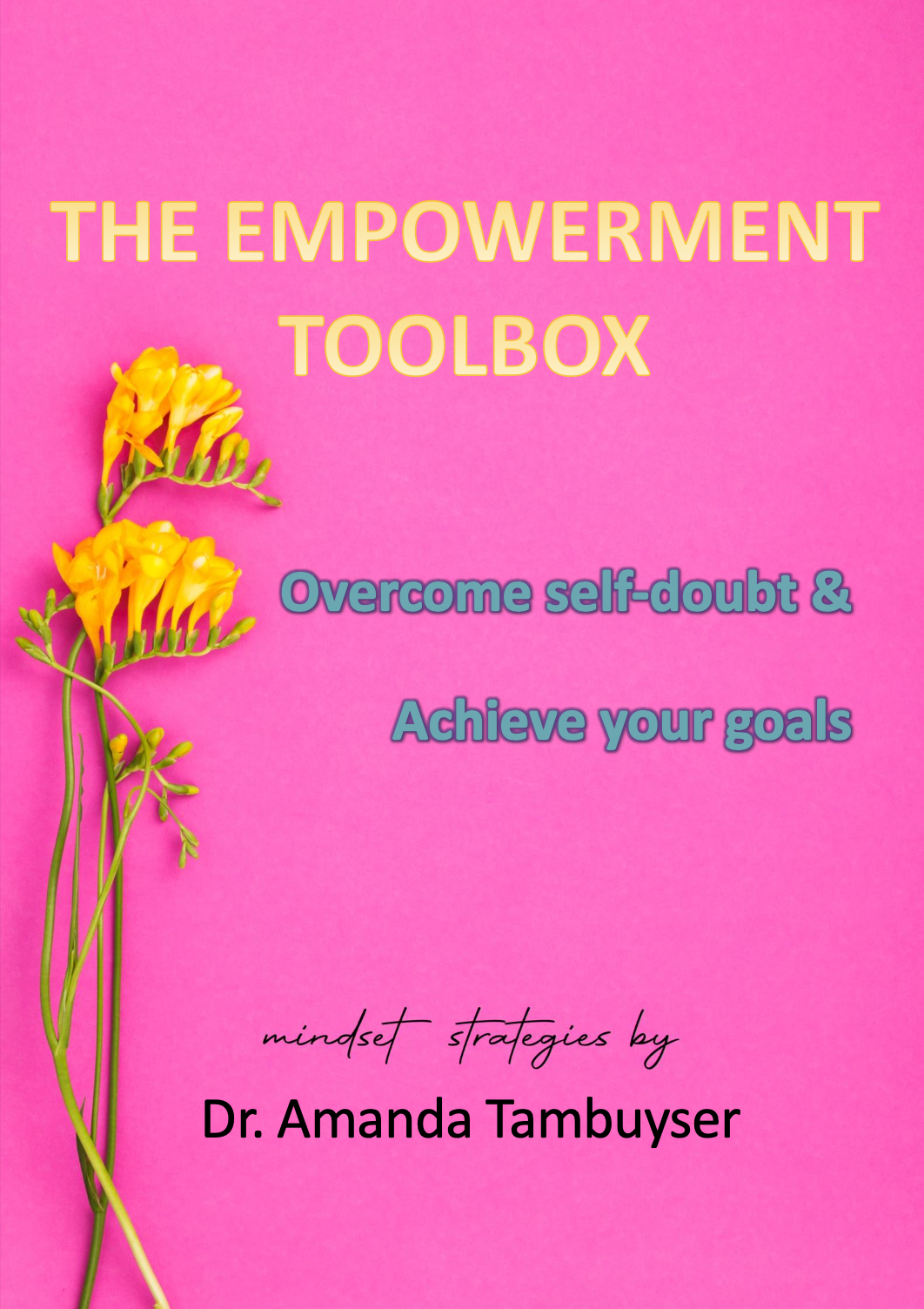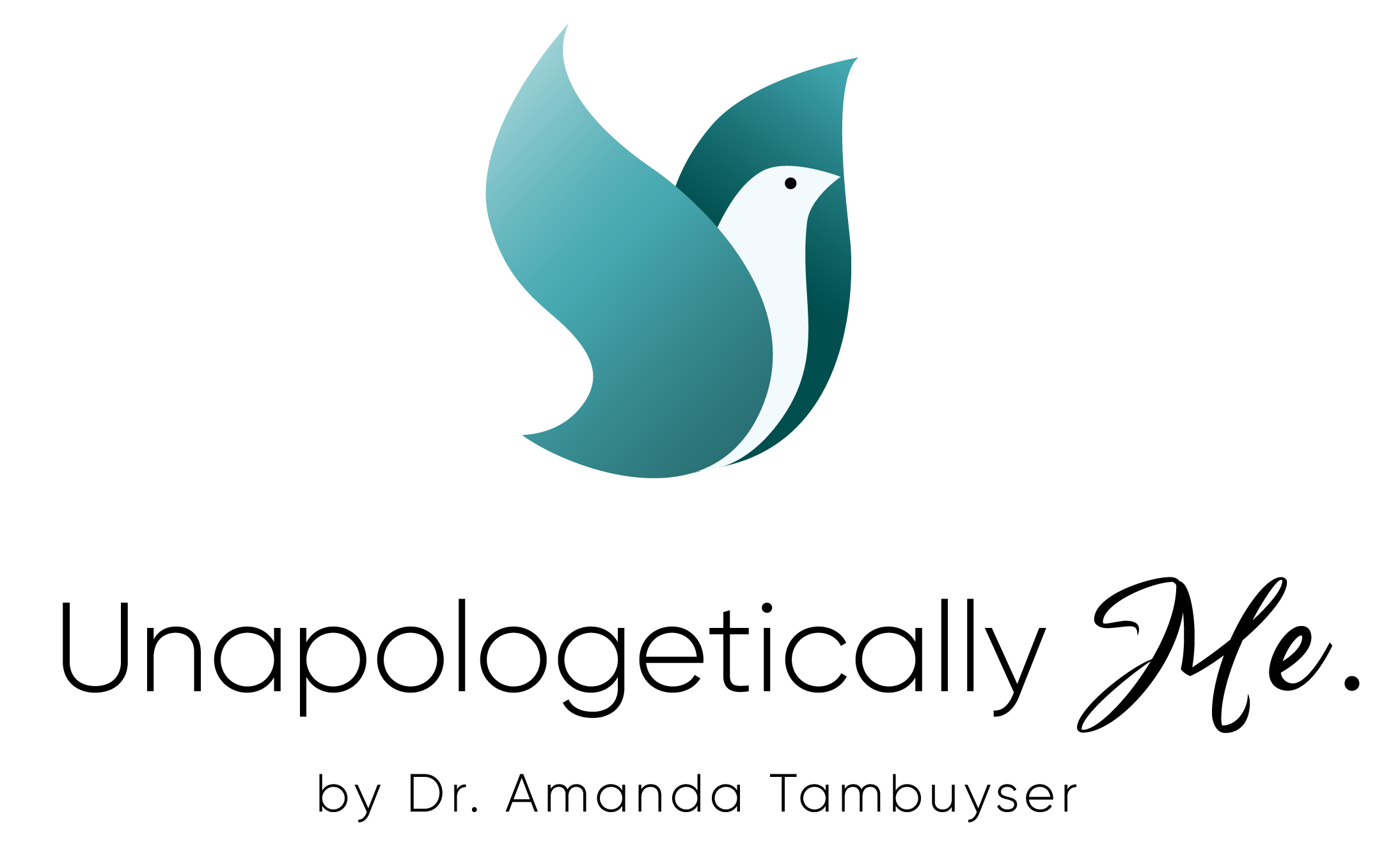FREE RESOURCES
Articles, E-book, Tips & Inspiration
The Secret to Stop Being Overlooked
Overwhelmed and Under Appreciated
Free video mini-course
Start your journey here!

Access Exclusive Content


The Empowerment Toolbox: Overcome Self-Doubt & achieve your goals
Embark on a transformative journey with "The Empowerment Toolbox: Overcome Self-Doubt & Achieve Your Goals," a comprehensive guide by Dr. Amanda Tambuyser designed to reshape your mindset and propel you toward success. This eBook is a treasure trove of mindset hacks and practical tools aimed at individuals seeking personal growth, career advancement, or enhanced well-being.
Key Highlights:
- Unlocking the Power of Mindset: Learn to cultivate the right mindset, a transformative tool that can reshape our reality, overcoming self-doubt and unlocking full potential.
- Core Beliefs and Their Impact: Explore how core beliefs shape our perceptions and responses to the world, and the importance of recalibrating unhealthy core beliefs for a resilient and empowering mindset.
- Practical Mindset Strategies: Dive into actionable strategies for daily integration, including cultivating a growth mindset, practicing self-compassion, and setting realistic goals.
- Harnessing Neuroplasticity: Understand the brain's flexibility and how intentionally moulding our neural pathways can lead to profound changes in thought patterns and behaviours.
Dr. Tambuyser's guide emphasises that overcoming self-doubt is a continuous journey that requires dedication and practice.
By integrating these mindset hacks into your daily life, you can gradually build confidence, silence your inner critic, and embark on a journey of self-discovery and success. A positive mindset is a powerful force that can transform self-doubt into unwavering self-belief, unlocking the potential for personal growth and achievement.
Please Fill Out This Form To Receive Your PDF.

How to find yourself: A Comprehensive Exploration of Finding Your Authentic Identity
Embarking on the journey of self-discovery is akin to navigating a labyrinth, a complex and winding path that leads to the core of one's authentic identity. In a world brimming with external influences and societal expectations, the pursuit of self-understanding becomes both a profound and necessary endeavor.
This blog post aims to delve deeper into the multifaceted aspects of self-discovery, providing not only practical tips but also a comprehensive exploration of the psychological, philosophical, and existential dimensions that contribute to the tapestry of our identity. As we unravel the layers of self, we'll uncover the richness of personal values, passions, and life experiences that shape our true essence.
The Philosophy of Self
Before we embark on the practical aspects of finding oneself, let's delve into the philosophical underpinnings of selfhood. Throughout history, great thinkers and philosophers have grappled with the question of identity. From Aristotle's concept of the "self" as an integrated whole to existentialist thinkers like Jean-Paul Sartre emphasizing individual responsibility, understanding the philosophical foundations of selfhood provides a solid framework for our journey.
1. Aristotle's Concept of the Integrated Self:
Aristotle, the ancient Greek philosopher, posited that the self is not a mere collection of disconnected traits but an integrated whole. According to his philosophy, the key to self-discovery lies in recognizing the interconnectedness of our thoughts, emotions, and actions. By exploring the harmony between different aspects of ourselves, we gain insight into our authentic identity.
2. Existentialism and Individual Responsibility:
Existentialist thinkers, including Sartre and Kierkegaard, emphasized individual responsibility in the creation of one's identity. In the existentialist view, authenticity arises from the choices we make and the responsibility we take for those choices. This philosophical perspective encourages us to actively shape our identity rather than passively accepting societal norms.
Practical Steps toward Self-Discovery
Building upon the philosophical foundation, let's explore practical steps that individuals can take to embark on their journey of self-discovery.
1. Reflecting on Core Values and Beliefs:
One of the initial steps in finding oneself is reflecting on core values and beliefs. Our values serve as guiding principles that shape our decisions and actions. Take the time to identify what truly matters to you, what principles resonate with your soul, and what ideals you hold dear. Journaling, meditation, or engaging in deep conversations with trusted friends can be valuable tools in this reflective process.
2. Unveiling Personal Passions:
Passions are the heartbeat of our authentic selves. Identifying and embracing personal passions can be a gateway to self-discovery. What activities make you lose track of time? What pursuits bring you unbridled joy? Dive into these passions, whether they are artistic endeavors, hobbies, or intellectual pursuits. Immersing yourself in what you love fosters a deep connection with your true self.
3. Assessing Strengths and Weaknesses:
Self-awareness is a cornerstone of self-discovery. Evaluating your strengths and weaknesses provides a roadmap for personal growth. Seek feedback from peers, mentors, or use personality assessments to gain insights into your unique strengths. Simultaneously, acknowledge areas for improvement, as embracing both strengths and weaknesses leads to a holistic understanding of oneself.
4. Navigating Through Life's Experiences:
Life is a mosaic of experiences, and each experience contributes to the canvas of our identity. Reflect on pivotal moments in your life, both positive and challenging. What lessons have you learned? How have these experiences shaped your beliefs and perspectives? By acknowledging and learning from life's experiences, you gain a deeper understanding of who you are and what truly matters to you.
5. Cultivating Self-Compassion:
Self-discovery is a journey laden with twists and turns, and self-compassion is the compass that guides us through it. Embrace your imperfections and setbacks with kindness and understanding. Treat yourself with the same compassion you would offer to a friend facing challenges. This nurturing mindset creates a supportive internal environment conducive to exploration and personal development.
6. Mindfulness: The Art of Being Present:
In a world inundated with distractions, practicing mindfulness becomes a powerful tool for self-discovery. Mindfulness involves being fully present in the moment, free from judgment or preconceived notions. Engage in mindfulness practices such as meditation, deep breathing, or mindful walking to heighten your awareness of thoughts, emotions, and surroundings. This heightened awareness fosters a deeper connection with your authentic self.
7. Building Meaningful Connections:
Human connections serve as mirrors reflecting different facets of our identity. Engage in meaningful conversations with friends, family, and mentors who encourage self-reflection. Share your thoughts and experiences, and actively listen to the perspectives of others. Meaningful connections provide diverse insights and contribute to the richness of your identity.
8. Embrace Change and Growth:
Understand that self-discovery is a dynamic process. Embrace change as a natural part of your journey and view challenges as opportunities for growth. Be open to reassessing your goals, values, and beliefs as you evolve.
9. Set Boundaries with Technology:
Mindfully navigate the digital landscape. Use technology as a tool for self-expression rather than a measure of self-worth. Consider incorporating periods of digital detox to disconnect and reconnect with your authentic self.
10. Seek Novel Experiences:
Step outside your comfort zone and expose yourself to new environments, activities, and perspectives. Novel experiences challenge preconceptions and broaden your understanding of yourself. Whether it's travel, learning a new skill, or engaging in unfamiliar social settings, embracing novelty can unlock hidden facets of your identity and contribute to personal growth.
The Role of Identity in Mental Well-being
Understanding the intricate relationship between identity and mental well-being is crucial in the pursuit of self-discovery. Research in psychology suggests that a strong sense of identity is linked to higher levels of life satisfaction, resilience, and overall mental health.
1. Identity and Mental Resilience:
A well-defined sense of self acts as a buffer against the challenges life presents. Individuals with a resilient identity are better equipped to navigate stressors, setbacks, and uncertainties. By establishing a foundation rooted in self-awareness, individuals can develop the mental resilience needed to weather life's storms.
2. The Impact of Identity on Life Satisfaction:
Numerous studies highlight the positive correlation between a strong sense of identity and life satisfaction. When individuals have a clear understanding of who they are and what they value, they are more likely to make choices aligned with their authentic selves. This alignment contributes to a sense of fulfillment and overall life satisfaction.
3. Identity Formation across the Lifespan:
Identity is not a static entity but a dynamic process that evolves across the lifespan. In adolescence, the quest for identity often takes center stage as individuals explore different roles and ideologies. However, identity exploration is not limited to youth; it continues to unfold in adulthood as individuals face new life stages, experiences, and challenges.
Embracing Change and Growth
The journey of self-discovery is not a linear trajectory; it's a continuous cycle of change and growth. Embracing change is a vital aspect of cultivating an authentic identity.
1. Adaptability and Evolution:
Being open to change and adaptation allows for continual personal growth. As we encounter new experiences, challenges, and perspectives, our identity undergoes transformations. Embracing these changes with a spirit of adaptability fosters a dynamic and resilient sense of self.
2. Reassessing Goals, Values, and Beliefs:
Self-discovery is an ongoing process that requires periodic reassessment of goals, values, and beliefs. As you gain new insights and experiences, be willing to reevaluate and adjust your life trajectory. This proactive approach ensures that your identity remains aligned with your evolving understanding of self.
The Intersection of Technology and Identity
In the digital age, technology plays a significant role in shaping identity. Social media, online platforms, and virtual interactions contribute to the construction of our digital selves. It's essential to navigate the digital landscape mindfully, recognizing both its potential benefits and pitfalls in the quest for self-discovery.
1. Social Media and Identity Construction:
Social media platforms provide a space for self-expression and connection, but they also present challenges in terms of identity construction. The curated nature of online personas can create a distorted version of reality. It's crucial to differentiate between the digital self and the authentic self, using online platforms as tools for self-expression rather than measures of self-worth.
2. Digital Detox and Mindful Technology Use:
Amidst the constant barrage of information and virtual interactions, incorporating periods of digital detox is essential. Disconnecting from screens allows for introspection and a return to the present moment. Mindful technology use involves consciously choosing when and how to engage with digital platforms, ensuring that online interactions align with your authentic self.
Conclusion
In the labyrinth of self-discovery, each turn, reflection, and experience contributes to the unveiling of our authentic identity. This comprehensive exploration has delved into the philosophical foundations, practical steps, psychological dimensions, and the evolving nature of selfhood. As you embark on your unique journey, remember that the path to self-discovery is not a destination but a continuous process of growth and exploration. Embrace the complexities of your identity, celebrate the nuances that make you unique, and revel in the ongoing adventure of discovering your authentic self.
FAQs
1. Why is understanding the philosophical underpinning of selfhood important in the journey of self-discovery?
Understanding the philosophical foundations of selfhood provides a solid framework for the journey of self-discovery. Concepts like Aristotle's integrated self and existentialist ideas of individual responsibility offer insights that can guide individuals in recognizing the interconnectedness of their thoughts, emotions, and actions.
2. How can one reflect on core values and beliefs as a practical step toward self-discovery?
Reflecting on core values and beliefs involves introspective practices such as journaling, meditation, or deep conversations with trusted friends. These activities help individuals identify guiding principles that shape their decisions and actions, leading to a deeper understanding of their authentic selves.
3. What role does mindfulness play in the process of self-discovery, and how can it be incorporated into daily life?
Mindfulness is a powerful tool for self-discovery, involving being fully present in the moment without judgment. Practices like meditation, deep breathing, or mindful walking can heighten awareness of thoughts, emotions, and surroundings. Incorporating mindfulness into daily life fosters a deeper connection with one's authentic self.
